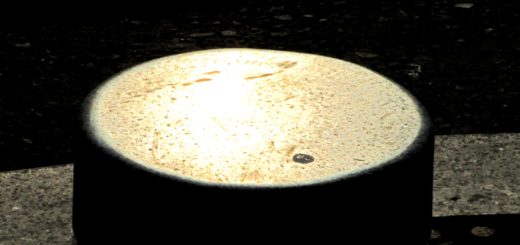Prager Forgives His Friends for Not Joining a Cult
Conservative radio host Dennis Prager has written an article for National Review in which he tries to explain the souls of those among his friends who continue to resist the wave of mindless partisanship and/or cultish idolization which Prager, a vocal Donald Trump supporter who wishes to retain his self-respect, defensively euphemizes as “not being a purist.”
 His article is getting a lot of attention, as other NR regulars, as well as contributors to various other “conservative media” locations, have leapt in to agree or disagree with Prager’s oh-so-moderate case against “conservative friends” who are so immoral and irrational as not to lend their full-throated support to perhaps the most immoral and irrational man ever to occupy the White House.
His article is getting a lot of attention, as other NR regulars, as well as contributors to various other “conservative media” locations, have leapt in to agree or disagree with Prager’s oh-so-moderate case against “conservative friends” who are so immoral and irrational as not to lend their full-throated support to perhaps the most immoral and irrational man ever to occupy the White House.
But even those who have chosen to defend themselves against Prager’s attack — pardon me, I mean against his sympathetic and sincere attempt to understand his dear friends — seem to me to have missed the point, and misunderstood the significance of what Prager’s article indicates, namely the extent to which a cult of personality has combined with a cult of establishmentarianism to addle the minds of hitherto sensible men, thereby setting American conservatism on the path to a thousand years of darkness. For the real problem with Prager’s essay is not that a Trump supporter has no business critiquing anyone else’s moral rectitude (though that’s true), nor that his case against his friends is full of straw men (though that’s true too), but simply that it reveals how a once-sensible conservative commentator has (hopefully only temporarily) lost even the rudimentary reasoning skills we would expect of a teenager making a case for borrowing his dad’s car. This is the real “Trump Derangement Syndrome”: the complete illogic demonstrated on a regular basis in his defense, often by people formerly thought to be eminently reasonable.
Whatever one might say to persuade NeverTrump conservatives to jump on the Trump bandwagon at least provisionally, for strategic purposes, Prager’s own argument for doing so begins sinking even before it weighs anchor, seeping reason from holes that appear right in the first sentence:
When people you know well and admire, and who share your values, do something you strongly oppose, you have two options:
(1) Cease admiring them or (2) try to understand them and change their minds.
Of course there is a third option, which Prager conveniently ignores because it would strain his untenable premises: Try to understand them in order to see whether they might have a convincing reason for opposing your position. After all, if you really “admire” someone, and share his “values” (“values” — ick! read your Allan Bloom, man!), then don’t you owe him the respect of assuming he might be as capable of thinking through a complex issue as you are, and therefore might have arrived at a conclusion more supportable than yours?
At any rate, given the loaded way Prager has framed the issue, he is obviously intending to “change their minds” rather than “cease admiring them.” How generous. And to further elaborate on his great generosity, presumably to persuade his fellow cultists — oops, I mean non-purists — to join him in being equally generous toward their own fallen acquaintances, he adds this in “defense” of his anti-Trump friends:
Every time we do good, we make a deposit into our moral bank account. And every time we do something bad, we make a withdrawal. These conservatives [i.e., his friends] have made so many deposits into their moral bank accounts that, in my view, their accounts all remain firmly in the black.
What a pal! Accusing his friends of moral evil for disagreeing with him, and then condescendingly forgiving them for their sin due to their having agreed with him about so many other matters in the past! I’m sure his friends, when they read those words, must have breathed a sigh of relief that Prager has kindly recalled their past camaraderie and not ceased admiring them outright, in spite of their recent immorality in not supporting a New York progressive hedonistic fame-whoring moron as “leader of the free world.”
With this opening insult to his friends’ moral character out of the way, Prager proceeds to insult their intellects, providing his best guesses as to why they chose to distance themselves from the Republican establishment’s preferred nominee this time around.
The first and, by far, the greatest reason is this: They do not believe that America is engaged in a civil war…they do not regard the left-right battle as an existential battle for preserving our nation. On the other hand, I, and other conservative Trump supporters, do.
To flesh that argument out a little for friends of Prager who may still be reeling from the flattery of being told they are still, on balance, somewhat moral in his eyes: If you didn’t cave into the GOP’s corporate socialist leadership and support Donald Trump — long-time Democrat donor, friend of Hillary Clinton, advocate of socialized medicine, and serial lying blowhard — that’s because you don’t understand that America is in an “existential battle.”
The adjectival insertion “left-right” helps Prager sustain this absurd straw man argument without even blushing. “Left-right” talk is the standard Republican Party rhetorical ploy to divert attention from the shiny progressive object some of us call the uniparty establishment. “If you don’t support the GOP, the progressives win,” they admonish — quaintly implying that the GOP leadership itself has not been an active if relatively silent partner in the progressive devolution of America for a century. (Please don’t object to this by shouting “Reagan” — a man hated and resisted for decades by the mainstream GOP, which has since done everything in its power to ensure their pseudo-conservative charade is never again usurped by an honest statesman.)
I haven’t conducted a survey of Prager’s “conservative friends,” but I would say, as a matter of common sense, that no American of any political awareness who would call himself a conservative today — and not just publicly for commercial benefit, but privately and sincerely — is unaware that he or she is engaged in a war for the nation’s survival. If Prager knows anyone who fits this description, I would love to hear that person identified by name, so I could take for myself the measure of his conservatism. Of course, Prager can provide no such names, for there are no such people, and he probably knows it.
So, absent Prager’s utterly untenable premise that there are a bunch of genuine conservatives who think America is in just dandy condition and can’t understand what Prager is all worked up about, how might we explain some people’s unwillingness to support Trump in the name of preserving the nation? Could it be that these NeverTrumpers see Trump, and the party that would nominate such a candidate for President, as part of the nation’s problem, i.e., as evidence of how thoroughly conservatism is losing, or has lost, the civil war that Prager believes only a Trump supporter can see?
In fact, while I’ve seen no evidence of any of Prager’s straw man conservatives who fail to recognize America’s perilous state, I have seen plenty of NeverTrumpers who fit my alternative premise to a T. I myself have several American conservative friends who are at least as deeply aware of the seriousness of America’s crisis as is Prager, and who rejected Trump and the GOP establishment for exactly that reason. In short, to be charitable to Dennis Prager and grant that he is not simply lying about knowing conservatives who think America is in good health, I offer him the following advice: Come down from the ersatz ivory tower of Prager University and read the comment sections of Right Scoop or Red State; you’ll be amazed to find dozens, perhaps hundreds, of people at least as conservative as your friends, but without your friends’ alleged naivety concerning the danger of America’s situation, who nevertheless proudly declare themselves NeverTrump. Imagine that.
Apparently unaware of such people, Prager continues on his merrily illogical way:
To my amazement, no anti-Trump conservative writer sees it that way. They all thought during the election, and still think, that while it would not have been a good thing if Hillary Clinton had won, it wouldn’t have been a catastrophe either.
First of all, whereas Prager had started out talking about “conservative friends,” he has now reduced himself to talking about “conservative writers” — in other words, he has turned his argument into a fraternal spat among people who play conservatives on TV, as it were, rather than genuinely conservative-minded Americans. (See my previous point about coming down from the ersatz ivory tower.)
This is a standard problem for mainstream “conservative media” types: Needing, for career reasons, to persuade their audiences that they are the torch-bearers of a movement, and their audiences mere followers, they actually start to believe their own hype, and refuse to acknowledge even the possibility — in fact a dead certainty — that they, the self-appointed experts, are nowhere near as educated, thoughtful, or principled as many of their readers or listeners. (They are sometimes helped by those audience members themselves, who are so desperate to feel that someone with a public voice really gets it, that they tend to feed the egos of the milquetoast climbers of the mainstream “conservative media” with their unwarranted loyalty. Witness the continued popularity of Rush Limbaugh, who has exposed himself as a fraudulent conservative performance artist six ways to Sunday, over many years, but continues to enjoy favored guest status in the homes of sensible people all over America — people who would reject such a manipulative snake oil salesman out of hand were he not a “media figure” who had the chutzpah to call himself a conservative on the radio at a time when those sensible people felt their voices were not being heard.)
And what of Prager’s allegation that anti-Trump conservatives thought Hillary Clinton’s victory wouldn’t have been a catastrophe? This premise, which also flies in the face of any common sense understanding of what a conservative is, depends for its plausibility on an unstated and highly questionable assumption which Prager makes throughout his argument, namely that Donald Trump’s election was not a catastrophe.
That is to say, every conservative I know — some of whom are notable conservative writers, by the way, though they may not qualify as such in the rarefied National Review air of Dennis Prager — saw the election of Hillary Clinton as a disastrous prospect, but wavered on voting for Trump, or outright refused to do so, on the grounds that he too represented a long-term threat to America’s survival; and perhaps (as some believed) an even greater threat, since his presidency would constitute an “enemy within” for conservatism, dividing the house for a generation, and imploding the movement in on itself, exactly as the Democrats and Trump’s GOP establishment supporters have always hoped to do.
As I have argued repeatedly, the Washington powers that be carefully and corruptly orchestrated the 2016 primary process to produce a general election between the two worst candidates — arguably the two worst humans — in the entire United States, virtually the poster boy and girl for everything rational men and women hate most about modern America. That these two were long-time political allies and friends, one the major donor of the other and golfing buddy of her husband, only added to the richness of the degradation. To declare that refusing to support Trump indicates a failure to appreciate the danger of Hillary is beyond insulting to the intelligence; if anything, it is Prager’s insistence that one must support Hillary’s friend and donor that indicates a failure to recognize the severity of America’s predicament.
Put simply, the catastrophic threat to America is not that Hillary Clinton was nominated for President, but that Donald Trump was nominated as the only electable alternative to her. How dare anyone insist, on moral grounds of all things, that rejecting that alternative equals failing to understand the nation’s crisis. This electoral alternative was, symbolically, the nation’s crisis.
Furthermore, and following from the above, isn’t it Prager and his Trumpish ilk who have failed to understand the depth of America’s problem? By insisting that voting for Trump was the solution to that problem, they show their superficiality, or their psychological inability to face harsh realities squarely, by revealing that they believe the problem is merely the popularity of the Democratic Party.
Yes, America is in a civil war. To imagine that the two sides in this war are led by Democrats and Republicans is the childish fantasy (at best) of one who needs to feel there are easy solutions to what are in fact intractable problems. Hence, they conclude that anyone who didn’t vote for Trump was ignorant of this war, because their naïve picture of the war is reducible to the simplistic electoral optics of Ds vs. Rs, Left vs. Right.
In fact, the two sides in America’s real civil war can be defined neither so neatly nor so optimistically. The true combatants are: on one side, the Washington uniparty, virtually the entire media (mainstream and alternative) that buys into or actively feeds the uniparty’s narrative, the entertainment industry with its endless progressive propagandizing, the entire public education apparatus, the heavily neo-Marxist-oriented academic and scholarly elite, and of course the vast administrative state which has grown to proportions of societal control that were barely a gleam in the eye of the American who pioneered the monstrosity of the modern bureaucratic monolith, Woodrow Wilson; and on the other side, a tiny minority of principled people, almost none of them active in any of the subsets controlled by the opposing faction, who still understand and care about America as founded, who think not in election cycles but in historical cycles, and who know that whatever was left of the American republic was slammed shut by Barack Obama’s election, and sealed shut by his re-election, both of which events were facilitated by the same Republican Party and pseudo-conservative establishment which are now telling them to get behind Donald Trump for the sake of America’s survival.
For the real conservatives, this has become a David and Goliath civil war, and, to put it mildly, it is not at all clear that Trump and his gang are on David’s team.
To buttress his fallacious argument that anti-Trump conservatives simply fail to understand the stakes, Prager offers two zingers of other-worldly shamelessness, to wit:
I am certain that only Donald Trump would have defeated Hillary Clinton.
In other words, I believe that Donald Trump saved the country.
The first is merely a completely unprovable assertion, and one which flies in the face of all the polling during the primaries, which showed several candidates doing much better than Trump in head to head match-ups against Clinton. The second is the sort of thing an intelligent man of any historical sense could say only about a truly world-historical leader — or, as in this case, about a cult leader. For it presumes that the country was indeed “saved” by the man in question.
How so? Thanks to Trump’s “replacement” version of government-controlled healthcare, worked out with Paul Ryan, the GOP, after promising for years to repeal ObamaCare, remains on a track toward Obama’s ultimate goal, the adoption of single-payer healthcare in the near future — a likelihood certified by Charles Krauthammer, the kind of man even Dennis Prager would probably classify as a bona fide “conservative writer.” (He isn’t one in my opinion, but that’s another matter.) Trump has begun the process of “pulling out” of the tyrannical Paris Climate Agreement, but has immediately signalled his wish to work with the Democrats to create one of his vaunted “better deals” on climate. Trump opposes free trade, supposedly the gold standard of conservative economic principles, in favor of protectionism and the populist bullying of businesses.
Beyond all that, there is the long-term strategic problem of allowing the conservative banner to be carried by a man so thoroughly recalcitrant to genuine conservative thought, or even to genuine thought of any kind, that he promises to make a muddled laughing stalk of the principled defense of America’s founding idea for a generation. How is that supposed to save the country? Oh, wait, I forgot, he has already saved it, just by being elected with an R next to his name, while not being named Hillary. What a cultist believes….
Finally, Prager concludes his argument with his greatest feat of illogic:
I have come to believe that many conservatives possess what I once thought was a left-wing monopoly — a utopian streak. Trump is too far from their ideal leader to be able to support him.
Nothing says “My party right or wrong” like accusing anyone who regards a party leader as “too far from ideal” of being utopian. Let’s parse that argument: Let’s say the Republican Party had nominated Hitler for President, or Stalin, or even Hillary Clinton. Those three would likely strike a typical conservative, or even Dennis Prager, as being “too far from the ideal leader to be able to support him/her.” Would a conservative who harbored such reservations be susceptible to the charge of utopianism for not supporting the Republican candidate? According to Prager’s reasoning, he would. That’s the logic of his argument: If you regard someone as too far from your ideal leader and therefore refuse to support him, you are a “utopian.” Presumably, the further from your ideal leader he is — i.e., the less willing you would be to support him — the more utopian you are.
This is not logic. This is desperate pleading from someone who has gotten so lost in faulty premises and false assumptions that he can no longer even understand what he himself is saying.
To this absurd charge of utopianism, Prager piles on with another beauty:
Anti-Trump conservatives are a very refined group of people. Trump doesn’t talk like them. Moreover, the cultural milieu in which the vast majority of anti-Trump conservatives [– clearly we are talking about connected Washington writers again, who, as I have noted, are hardly representative of principled anti-Trump conservatives –] live and/or work means that to support Trump is to render oneself contemptible at all elite dinner parties.
At this point, Prager has apparently forgotten that he was allegedly talking about his “friends,” people still in the moral black according to his weird accounting, as he now labels them elitists who don’t support Trump — and by obvious implication, don’t respect Trump’s supporters — merely because they are snobs.
In other words, he has bought into the populist demagoguery that has sustained the Trump cult from the beginning: “Them educated types with their big words just don’t understand us normal Americans, so screw ’em!”
Yeah, right. Perhaps the “elitists” are just confused by the Russian accent.
Anyway, after proving exactly nothing, let alone against any adversary who actually exists, Prager re-enters his previous sympathy mode. Presumably he thinks he’s broken them (the non-existent) down now, so he can generously swoop in and rally them (no one) to his side:
They can accept an imperfect reality and acknowledge than we are in a civil war, and that Trump, with all his flaws, is our general. If this general is going to win, he needs the best fighters….
I beg them: Please report for duty.
Reiterating his own fallacious arguments, he now claims that Trump — whom he has previously said was the only man who could beat Hillary and by so doing saved America — is “our general” in the civil war, to whom Prager’s conservative friends ought to “report for duty.”
Duty to whom? Given the preceding argument, the definition of the Republican Party as the army for American principles, and the outrageous designation of Trump as America’s savior, the answer is obvious. No one who could make such a statement is thinking like an American conservative. Or at least not any of the conservatives I know, most of whom are at least as skeptical of Trump as are any of Dennis Prager’s imaginary friends.


